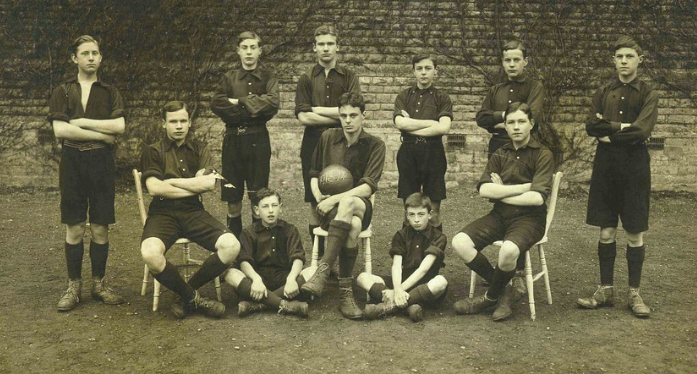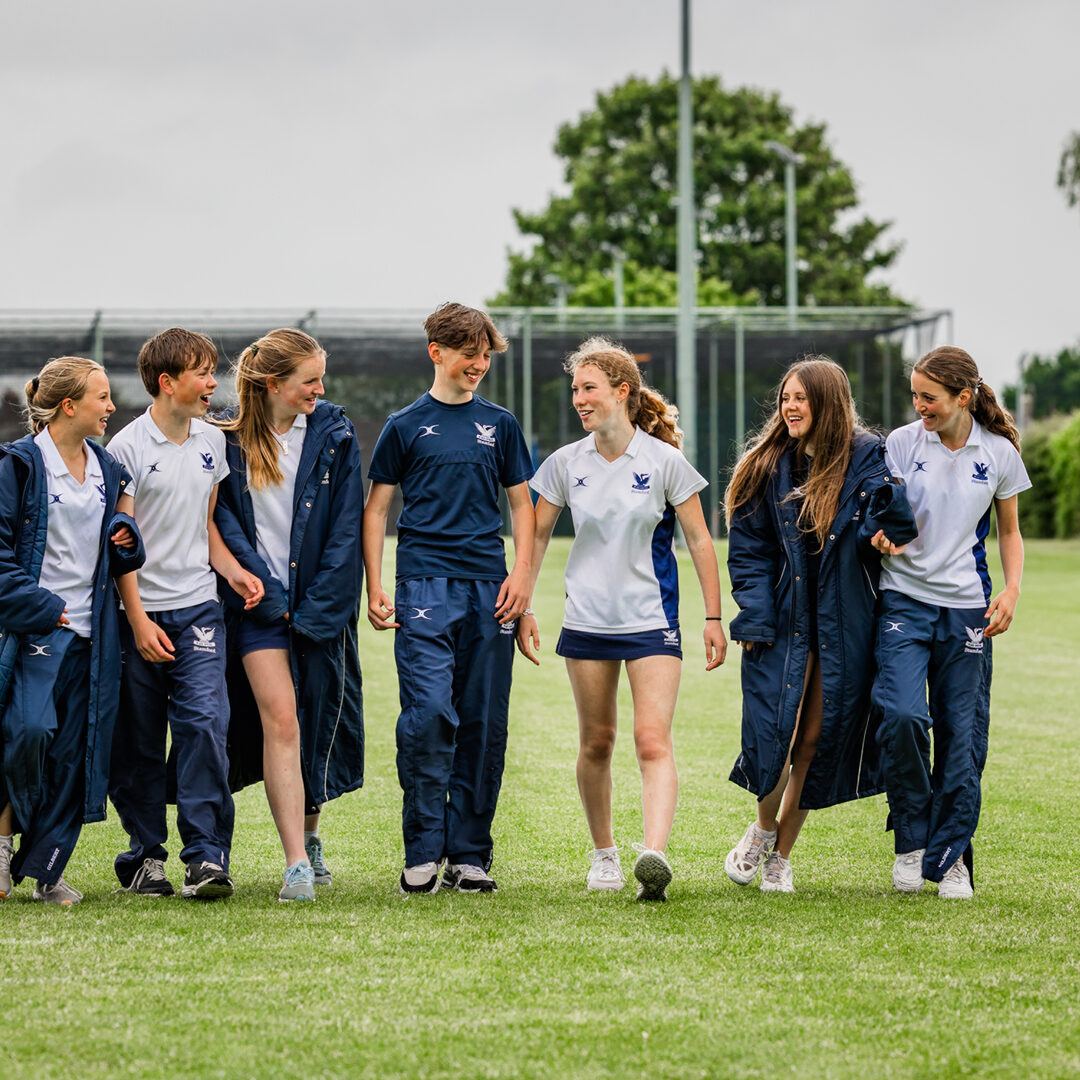Our Stamford Schools' Archivist, Mr James Buckman, explores the history of pupil and staff member, Mr Francis John Cummins, who was a lifelong member of our Stamford community.
F. J. Cummins (Pupil, 1907-14, Assistant Master at Stamford School, 1920-6)
Francis John Cummins attended a Stamford School as a pupil from 1907-14. After serving in the First World War, he became a teacher at his old school for six years but spent most of his career days working as an assistant master at Bedford School. For the second half of this article, I was granted access to the digital archives of Bedford School.
Pupil at Stamford School (1907-14)
Francis first came to Stamford School as a boarding pupil in 1907 during the headship of Edwin Lovegrove. He became a School Prefect, and he turned out to be a brilliant sportsman.

This photograph depicts the 1st XI Football Team for the 1913-14 season. We don’t have any names, but we do know that Francis was captain of the team for the said season, so he might be the one holding the football. On the football field, Francis filled in many positions but left-back was always his best place.In 1913, Canon Day became Headmaster. One of his first acts was to introduce a network of committees – each represented a sport taught at the School. Francis became Hon. Secretary for the Football Committee. He also had similar success at Cricket.‘The best cricketer’ the School had seen for many years, Francis captained the 1st XI Cricket Team for the same season as Football, and won the Cricket Colours. He was ‘a good captain and the mainstay of the side. Drives with great power and with a straight bat. Bowled with good effect when his modesty allowed him to do so’. At Sports Day, he won the School Shield on two consecutive years and broke the School Record at the Hurdles finishing the race in just over 15 seconds. Unsurprisingly, Francis’ departure from the School in 1914 was considered ‘a heavy loss’ to the School Games.Francis won the Exeter Exhibition of £20 which covered the fees for him to attend St John’s College, Cambridge. He dropped out after one term to fight in the First World War.
During the war
Francis served in the Dorsetshire Regiment. By 1915, he was a Lieutenant in the 6th Battalion. He was wounded at least three times in battle, though not severely enough for him to be invalided out of the army. When on leave, Francis often visited Stamford School in uniform and gave lectures on his experiences in trench warfare. For example, in 1918, he spoke about his participation at Ypres (which can be found in the digital archive). By the end of the war, he had made the rank of Captain.
Assistant Master at Stamford School (1920-6)
Francis spent two terms teaching at Stamford School in 1919 before he returned to Cambridge to complete his degree. In 1920, he returned to the School as a full-time assistant master. The School hoped that under Francis’ leadership, they might have a rugby team ‘prepared to take the field against all comers’. The 1st XV rugby team did not get off to a good start. There was ‘a continued feeling of unrest in the team’. In 1923, the team displayed a spirit of unity, and by working together, their performances improved.Francis ‘contributed greatly to the planning and development of the School fields’. His pupils included C.A.M. ‘Squibs’ Bowman (OS 1918-26) who would also become a teacher at Stamford School. W.R. Hare (OS 1917-23) recalled that Francis had a significant influence over Squibs. As a teacher, Squibs would change the face of the School by levelling the school playing fields – a skill which he appropriated from Francis. Francis also taught Squibs the value of the Old Stamfordian Club.When Francis left the School in 1926, Canon Day was ‘exceedingly sorry to lose one with whom he had been associated for so many years’. Francis’ association with Stamford School did not finish there. He remained an active member of the Old Stamfordians’ Club and participated in their Cricket Matches. He presented the School with a vestry table for its Chapel when it opened in 1930. Furthermore, he chaired a Committee to consider how to commemorate Old Stamfordians lost in the Second World War.
Assistant Master at Bedford School (1926-60)
At Bedford School, Francis taught mathematics, but outside the classroom his activities were numerous. Francis was an enthusiast on amateur dramatics and was instrumental in founding Bedford School’s Dramatic Society in 1928. He also became Treasurer of the Fifth Bedfordshire Scout Troop, and later was made Scoutmaster. However, it seemed inevitable he would become interested in the School games.For many years, Francis coached Cricket and Rugby at Bedford School. He allowed every applicant to participate in his Colts cricket trials, and had a knack in picking out a boy in whom nobody else saw any potential and make something of him. Outside the School, Francis became a member of the Bedfordshire Golf Club. He putted with so much guile that he could hit the ball across a great distance.When the Second World War broke out in 1939, Francis was more than willing to serve his country. He balanced his teaching duties at Bedford School with serving as the Assistant County Welfare Officer for Bedfordshire. In 1940, he wrote an article in the School magazine calling on the boys not to waste paper during a time of rationing.In 1945, Francis experienced a severe illness which forced him to give up active participation in sports. Nevertheless, he became the master in charge of cricket at Bedford School. He held this position for the final fifteen years he spent at this School.Francis’ retirement from Bedford School was well-earned after all his hard work, but sadly he would not enjoy it for very long. Just months later, he died at his home in Kettlebaston, Suffolk on 24th November 1960 at the age of 65.At Bedford School, Francis taught mathematics, but outside the classroom his activities were numerous. Francis was an enthusiast on amateur dramatics and was instrumental in founding Bedford School’s Dramatic Society in 1928. He also became Treasurer of the Fifth Bedfordshire Scout Troop, and later was made Scoutmaster. However, it seemed inevitable he would become interested in the School games.
Thanks go to Bedford School Archives for their support on this piece, and for their provision of photography. For more highlights from the Stamford Endowed Schools' archives, please
click here, or browse the archives yourself,
here. 


 This photograph depicts the 1st XI Football Team for the 1913-14 season. We don’t have any names, but we do know that Francis was captain of the team for the said season, so he might be the one holding the football. On the football field, Francis filled in many positions but left-back was always his best place.In 1913, Canon Day became Headmaster. One of his first acts was to introduce a network of committees – each represented a sport taught at the School. Francis became Hon. Secretary for the Football Committee. He also had similar success at Cricket.‘The best cricketer’ the School had seen for many years, Francis captained the 1st XI Cricket Team for the same season as Football, and won the Cricket Colours. He was ‘a good captain and the mainstay of the side. Drives with great power and with a straight bat. Bowled with good effect when his modesty allowed him to do so’. At Sports Day, he won the School Shield on two consecutive years and broke the School Record at the Hurdles finishing the race in just over 15 seconds. Unsurprisingly, Francis’ departure from the School in 1914 was considered ‘a heavy loss’ to the School Games.Francis won the Exeter Exhibition of £20 which covered the fees for him to attend St John’s College, Cambridge. He dropped out after one term to fight in the First World War.
This photograph depicts the 1st XI Football Team for the 1913-14 season. We don’t have any names, but we do know that Francis was captain of the team for the said season, so he might be the one holding the football. On the football field, Francis filled in many positions but left-back was always his best place.In 1913, Canon Day became Headmaster. One of his first acts was to introduce a network of committees – each represented a sport taught at the School. Francis became Hon. Secretary for the Football Committee. He also had similar success at Cricket.‘The best cricketer’ the School had seen for many years, Francis captained the 1st XI Cricket Team for the same season as Football, and won the Cricket Colours. He was ‘a good captain and the mainstay of the side. Drives with great power and with a straight bat. Bowled with good effect when his modesty allowed him to do so’. At Sports Day, he won the School Shield on two consecutive years and broke the School Record at the Hurdles finishing the race in just over 15 seconds. Unsurprisingly, Francis’ departure from the School in 1914 was considered ‘a heavy loss’ to the School Games.Francis won the Exeter Exhibition of £20 which covered the fees for him to attend St John’s College, Cambridge. He dropped out after one term to fight in the First World War.